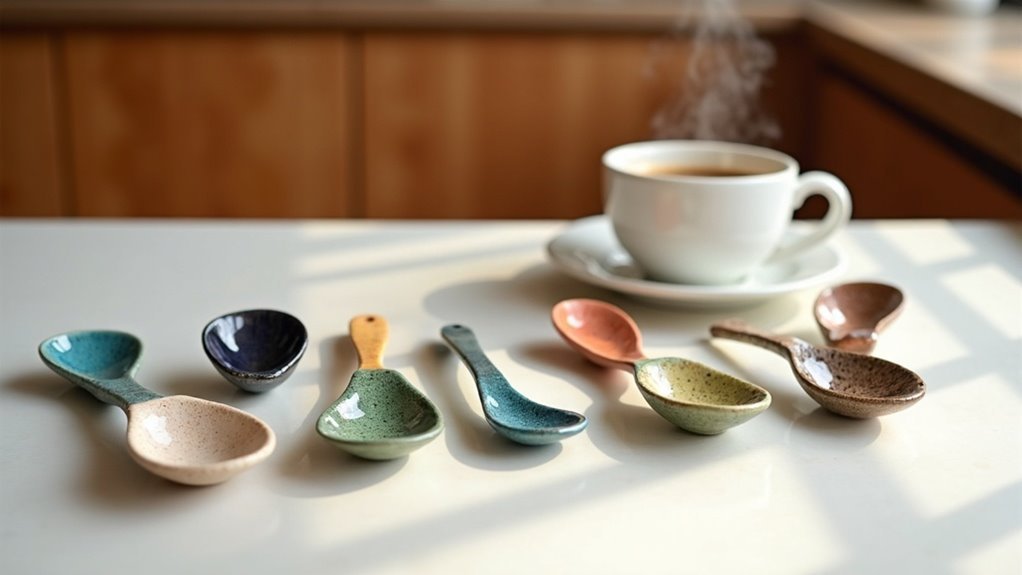Yes, coffee can interfere with calcium absorption. High caffeine intake, particularly over 800 mg, increases urinary calcium excretion and impairs calcium metabolism, which can elevate the risk of osteoporosis, especially in those with low dietary calcium. If you’re enjoying moderate amounts of coffee, make sure your calcium intake is adequate to support bone health. Understanding how caffeine in coffee affects your bones is crucial for making informed dietary choices—exploring more about this topic will provide you greater insights.
Key Takeaways
- High caffeine intake (over 800 mg) from coffee can increase urinary calcium excretion and impair calcium metabolism.
- Excessive coffee consumption may lead to decreased calcium absorption, particularly in individuals with low dietary calcium.
- For healthy adults, consuming up to 400 mg of caffeine daily from coffee poses minimal risks if dietary calcium is sufficient.
- Postmenopausal women and individuals at risk for osteoporosis should closely monitor their coffee intake to maintain bone health.
- Adequate vitamin D and regular physical activity are essential to counter caffeine’s negative effects on calcium absorption from coffee.
Understanding Caffeine and Its Impact on Calcium Absorption
While you may enjoy your daily cup of coffee, it’s important to understand how caffeine affects calcium absorption in your body.
High caffeine intake, particularly over 800 mg daily, can greatly increase urinary calcium excretion, impairing calcium metabolism. This disruption can also interfere with vitamin D binding, further reducing calcium absorption efficiency.
High caffeine intake can increase urinary calcium loss, impairing metabolism and reducing vitamin D binding for optimal calcium absorption.
Inadequate calcium absorption negatively impacts bone density, raising your risk of osteoporosis. However, moderate caffeine intake from coffee generally poses minimal risks, especially if your dietary calcium is sufficient.
Balancing your coffee consumption with adequate calcium can help maintain your bone health and overall well-being. Enjoy your coffee, but be mindful of your calcium intake!
Research Findings on Caffeine’s Effects on Bone Health
You should be aware that high caffeine intake from coffee can significantly affect your calcium absorption and may increase your risk of osteoporosis.
While some studies suggest minimal impact on bone turnover, the overall evidence highlights potential risks associated with excessive coffee consumption.
Understanding these findings is essential for maintaining optimal bone health, especially if your diet is already low in calcium.
Enjoy your coffee, but be mindful of your overall caffeine intake!
Caffeine’s Impact on Calcium
Caffeine’s impact on calcium absorption is an important consideration for coffee enthusiasts who are concerned about bone health, especially given the growing prevalence of osteoporosis. Research shows that high caffeine consumption from coffee can lead to decreased calcium absorption, increasing the risk of fractures. For instance, consuming around 800 mg of caffeine daily—equivalent to roughly 8 cups of coffee—can raise urinary calcium loss by 77%. Additionally, caffeine may disrupt vitamin D binding, further hindering calcium absorption. Here’s a quick overview of caffeine’s effects on calcium:
| Caffeine Level | Effect on Calcium Absorption |
|---|---|
| Low (under 400 mg) | Minimal impact |
| High (800 mg+) | 77% increase in urinary calcium |
| Disrupted Vitamin D | Compounds negative effects |
| Low Calcium Intake | Increased fracture risk |
| Postmenopausal Women | Higher osteoporosis risk |
As coffee lovers, it’s essential to be mindful of these effects while enjoying your favorite beverage.
Osteoporosis Risk Factors
Understanding the impact of coffee consumption on osteoporosis risk factors is essential, particularly given the high caffeine content in many coffee beverages.
Excessive caffeine intake from coffee can lead to increased calcium loss, which is especially concerning for postmenopausal women. Research indicates that caffeine can interfere with calcium absorption and disrupt vitamin D binding, both of which are crucial for maintaining strong bones.
A 2021 study revealed that consuming 800 mg of caffeine daily, often achieved through coffee, might elevate urine calcium excretion by 77%, thereby raising osteoporosis risks.
Therefore, it’s vital to monitor your coffee intake, especially if your dietary calcium is insufficient, to effectively support your bone health.
Conflicting Study Results
While some studies suggest that coffee consumption might negatively impact bone health, others show no significant connection, leading to a confusing landscape of research.
For instance, a 2015 study on rats indicated that high coffee intake decreased bone mass. However, a 1992 study involving postmenopausal women found no correlation between coffee consumption and bone turnover.
The relationship between coffee intake and calcium loss is complex; some research shows increased calcium loss with high coffee consumption, while other studies remain inconclusive.
Safe Caffeine Intake Recommendations
When it comes to coffee consumption, healthy adults can safely enjoy up to 400 mg of caffeine daily, which is roughly equivalent to about four 8-ounce cups of brewed coffee.
However, if you’re pregnant or at risk for osteoporosis, it’s vital to adjust your limits. Pregnant individuals should cap their coffee intake at 200 mg, which is about two 8-ounce cups.
Children and adolescents should avoid coffee entirely due to developmental concerns. If you’re part of an at-risk group, monitoring your coffee consumption alongside ensuring sufficient calcium and vitamin D is essential for maintaining bone health.
Daily Caffeine Limits
Caffeine consumption can be safely enjoyed by most healthy adults, with a daily limit of up to 400 mg recommended to minimize health risks. This amount, roughly equivalent to four 8-ounce cups of brewed coffee, allows you to balance your caffeine intake while ensuring you get adequate calcium and vitamin D to support bone health.
However, if you’re at risk of osteoporosis, it’s essential to monitor your caffeine consumption since high caffeine intake may exacerbate calcium loss and affect calcium absorption.
When enjoying coffee, remember to prioritize your overall nutrient intake to maintain strong bones and reduce potential health risks.
At-Risk Populations
Certain populations face higher risks related to coffee consumption, particularly concerning calcium absorption and bone health.
Pregnant individuals should limit their coffee intake to 200 mg of caffeine daily to safeguard bone development. Healthy adults can enjoy up to 400 mg, but those at risk for osteoporosis must monitor their coffee consumption closely.
Children and adolescents should avoid coffee due to its negative effects on calcium absorption. For the elderly, regular monitoring of coffee intake is essential as they face increased calcium loss.
Additionally, individuals with low calcium and vitamin D intake should exercise caution with coffee, as it can exacerbate deficiencies and weaken bones.
Mechanisms of Caffeine’s Influence on Bone Strength
While many savor coffee for its stimulating effects, it’s important to consider its potential impact on bone strength through various mechanisms. Caffeine can reduce calcium absorption in the intestines, which is essential for maintaining bone density. Additionally, increased caffeine consumption can lead to elevated urinary calcium excretion, resulting in a negative calcium balance. High doses of caffeine may also decrease osteogenic activity, which can weaken bone tissue. Furthermore, caffeine interferes with vitamin D binding, impairing the efficiency of calcium absorption and exacerbating its adverse effects.
| Mechanism | Impact on Bone Strength |
|---|---|
| Reduced calcium absorption | Lowers bone density |
| Increased calcium excretion | Creates negative calcium balance |
| Decreased osteogenic activity | Weakens bone tissue |
Counteracting Caffeine’s Negative Effects on Bone Health
To maintain ideal bone health while enjoying coffee, it’s essential to adopt strategies that counteract caffeine’s potential negative effects.
Ensure you have an adequate intake of dietary calcium, especially from dairy or fortified foods, to aid in calcium absorption. Pairing your coffee with small amounts of milk or other calcium-rich foods can help mitigate calcium loss associated with caffeine.
Incorporate calcium-rich foods with your coffee to support calcium absorption and counteract caffeine’s effects.
Keep an eye on your vitamin D levels, as they’re crucial for enhancing calcium absorption. Incorporating regular physical activity, particularly weight-bearing exercises, can further improve bone density.
If you’re at risk of osteoporosis, consider limiting your coffee intake and focusing on a balanced diet that’s rich in calcium and vitamin D.
Risk Factors for Osteoporosis Linked to Caffeine Consumption
Caffeine consumption, particularly from coffee, poses several risk factors for osteoporosis when intake exceeds moderate levels. High caffeine intake, defined as over 800 mg daily, considerably increases urinary calcium excretion, potentially leading to decreased bone density.
For individuals, especially postmenopausal women, who consume less than 400 mg daily, the risk of bone loss is remarkably lower.
Coffee, being a significant source of caffeine, can interfere with calcium absorption, and when combined with low dietary calcium, the risk of developing osteoporosis escalates.
As a result, monitoring coffee consumption is crucial, especially for those at risk, including older adults and individuals with inadequate calcium intake.
Dietary Recommendations for Maintaining Bone Health
Maintaining bone health involves more than just enjoying your daily cup of coffee.
While caffeine can impact calcium absorption, a balanced diet rich in essential nutrients is crucial. Here are three dietary recommendations to support bone health while still savoring your coffee:
- Aim for a calcium intake of 1000 mg daily, increasing to 1200 mg if you’re over 50 or 70. Consider pairing your coffee with milk to boost your calcium intake.
- Incorporate vitamin D-rich foods like fatty fish and fortified dairy into your meals to enhance calcium absorption, especially if you’re a coffee lover who might enjoy a latte or cappuccino.
- Limit caffeine intake to 400 mg daily. If you enjoy multiple cups of coffee, be mindful of your total caffeine consumption and think about consuming milk or dairy alternatives with your coffee to support calcium metabolism.
The Role of Physical Activity in Bone Health Management
While many people associate strong bones with adequate nutrition, regular physical activity, combined with mindful coffee consumption, plays an essential role in bone health management.
Engaging in weight-bearing exercises like walking and resistance training greatly boosts bone density and can help counter caffeine’s potential negative effects on calcium absorption. Studies show that physical activity enhances calcium metabolism, stimulating bone remodeling and deposition.
Weight-bearing exercises enhance bone density and counter caffeine’s impact on calcium absorption, promoting better bone health.
Additionally, moderate coffee consumption can be part of a balanced diet when balanced with adequate calcium intake. The American College of Sports Medicine recommends at least 150 minutes of moderate aerobic activity and muscle-strengthening exercises weekly.
Active individuals enjoy lower risks of osteoporosis and fractures due to improved muscle strength, balance, and coordination, making a holistic approach to bone health crucial—one that considers both physical activity and dietary choices like coffee.








